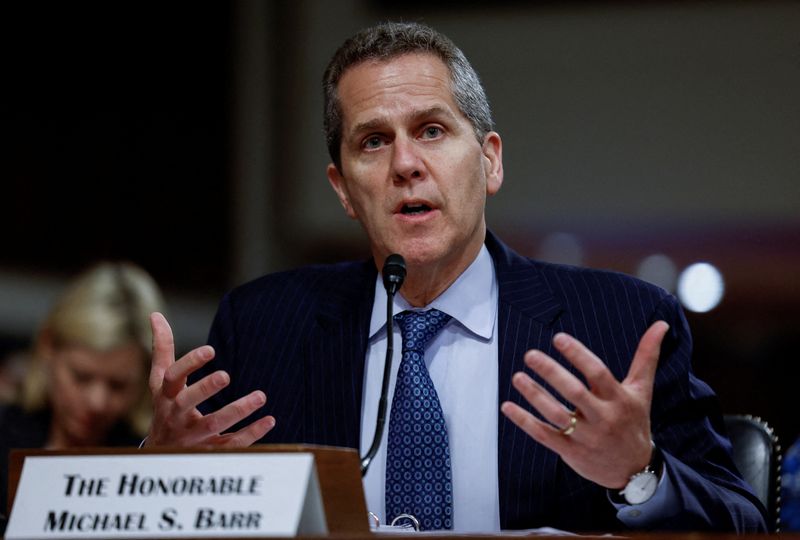By Pete Schroeder and Michelle Price
WASHINGTON (Reuters) -The Federal Reserve's top Wall Street cop Michael Barr and other bank regulators sought to reassure skeptical U.S. lawmakers on Tuesday that their plans to hike U.S. bank capital requirements would not impede lending or hurt small businesses.
Members of the U.S. Senate Banking Committee from both parties pressed Barr, the Federal Deposit Insurance Corporation's Martin Gruenberg and acting Comptroller of the Currency Mike Hsu on their "Basel III Endgame" proposal which would overhaul how banks gauge risk and, in turn, how much capital they must hold against potential losses.
The regulators argued stronger cash cushions will help firms withstand surprise losses, while reiterating they are open to feedback on the proposal and willing to make adjustments.
"We recognize the rule may not appropriately capture all risks. We welcome all comments on all aspects of the rule, and we will take these comments seriously to improve the rule," Barr said during the two-hour hearing.
Banks are fighting hard to soften the proposal, arguing it will suck credit out of the economy. As part of their campaign, banks have been lobbying lawmakers to press the regulators to review the rule. On Monday, 39 Senate Republicans stepped up the pressure, asking the regulators to scrap the proposal.
In a further sign that campaign is gaining steam, numerous moderate Democrats joined Republicans on Tuesday in expressing concerns about aspects of the rule, including whether it could make mortgages more expensive for low-income Americans.
"If this rule doesn’t work, it’s going to raise hell with the economy," said Democratic Senator Jon Tester.
Barr repeatedly emphasized that the proposal as written would only apply to a handful of the nation's largest banks, and that the focus is primarily on stricter requirements for activities like trading, as opposed to traditional lending.
Some Democrats urged the agencies to hold firm against industry criticism and complete the rules, which were first envisaged following the 2007-2009 global financial crisis.
"These capital rules represent the final and long, long overdue plank in the post-financial crisis overhaul," said Senator Sherrod Brown, who chairs the committee.
"I hope you’ll see these arguments for what they really are, the same old Wall Street whining."

Separately, the FDIC's Gruenberg was consistently pressed by lawmakers over a Wall Street Journal report that female employees had left the regulator due to its "toxic" culture and that sexual harassment was not punished.
Gruenberg, who has been at the agency since 2005, told lawmakers he was distraught over the report and vowed action.